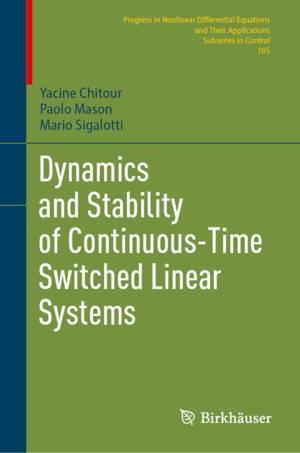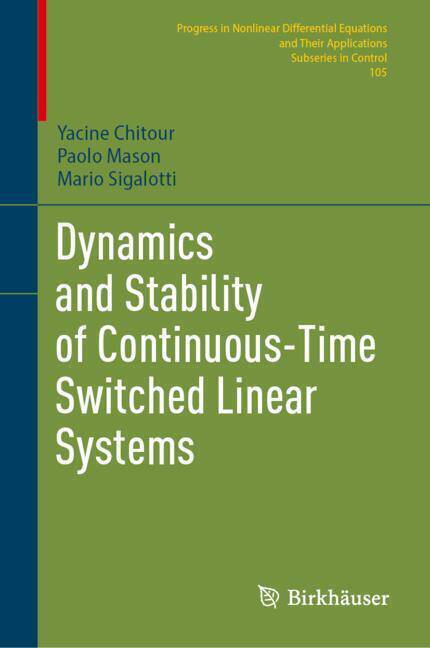
- Retrait gratuit dans votre magasin Club
- 7.000.000 titres dans notre catalogue
- Payer en toute sécurité
- Toujours un magasin près de chez vous
- Retrait gratuit dans votre magasin Club
- 7.000.0000 titres dans notre catalogue
- Payer en toute sécurité
- Toujours un magasin près de chez vous
Dynamics and Stability of Continuous-Time Switched Linear Systems
Yacine Chitour, Paolo Mason, Mario SigalottiDescription
Linear switched systems are a fascinating field of research, with many theoretical questions arising from applications which require sophisticated mathematical tools for their resolution. This monograph presents a unified theoretical approach for the analysis of stability of continuous-time linear switched systems, organizing and optimizing results scattered throughout literature. Emphasis is placed on the development of a rigorous and complete mathematical theory.
In addition to fundamental tools such as common Lyapunov functions, converse Lyapunov theorems, and maximal Lyapunov exponents, the concept of Barabanov norm is also discussed. While this is now well understood from a theoretical point of view, it has not received much attention in more application-focused settings, likely because this fundamental object was developed in the context of arbitrary switches but has no immediate equivalent for classes of switching signals subject to various constraints (dwell time, persistent excitation, etc.). One of the aims of this text is to bridge this gap as far as possible by explaining how the main features of Barabanov norms can be generalized for classes of constrained switchings. Throughout the text, the authors maintain a general point of view, rather than treating classes of switching signals separately, by developing an axiomatic approach and identifying structural properties of these classes that allow crucial aspects of the Barabanov norm to be extended.
This monograph will be a valuable resource for mathematicians and control engineers interested in continuous-time switched linear systems, as well as a definitive reference for more experienced researchers.
Spécifications
Parties prenantes
- Auteur(s) :
- Editeur:
Contenu
- Nombre de pages :
- 197
- Langue:
- Anglais
- Collection :
- Tome:
- n° 105
Caractéristiques
- EAN:
- 9783031829819
- Date de parution :
- 28-04-25
- Format:
- Livre relié
- Format numérique:
- Genaaid
- Dimensions :
- 155 mm x 235 mm

Les avis
Nous publions uniquement les avis qui respectent les conditions requises. Consultez nos conditions pour les avis.






